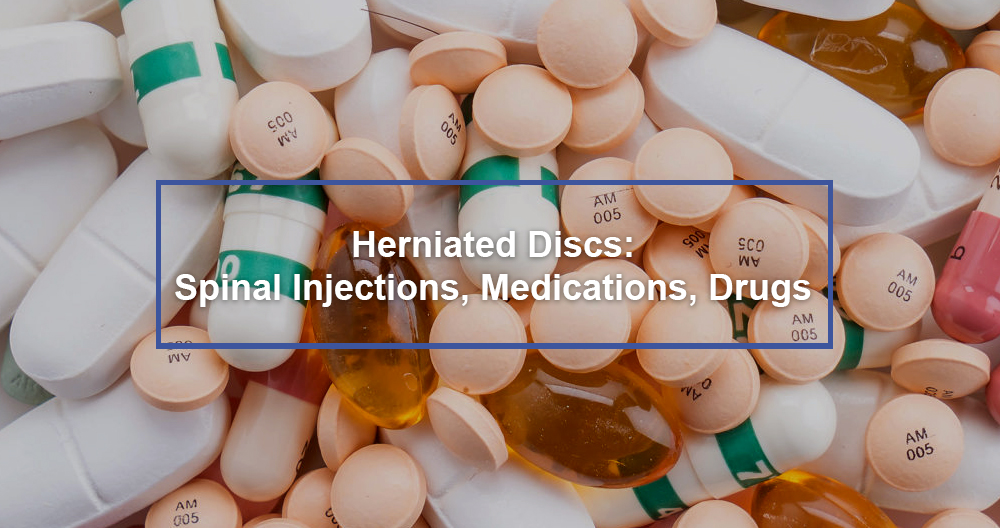
Herniated discs can often cause swelling and pain by compressing nerve roots around the affected discs. There are many medications available depending on the severity of your symptoms. However, medications and drugs won’t cure herniated spines. They can only relieve the discomfort.
Like all medications or drugs, it is important to consult your doctor first. The majority of people start with prescription medications and then switch to over-the-counter drugs. You can still get relief with spinal injections, which deliver powerful medication directly to the root cause of your pain.
Herniated Discs Treatment
The majority of people who experience pain symptoms within a few days to weeks can get relief through conservative treatment. This mainly involves modifying your activities to avoid pain, and taking pain medication.
Herniated Discs Medications
- Non-prescription pain medications. Your doctor may recommend pain medication that is not prescribed if you have mild or moderate pain. Examples include acetaminophen (Tylenol), ibuprofen, Motrin IB (others), and naproxen sodium (“Aleve”)
- Neuropathic drugs. These drugs decrease pain by altering nerve impulses. They include gabapentin (“Gralise,” Horizant, Neurontin”), pregabalin (“Lyrica”), duloxetine (“Cymbalta,” Drizalma Sprinkle”), and venlafaxine (“Effexor XR”).
- Muscle relaxers. These might be prescribed to you if your muscles are spasming. These side effects can include dizziness or sedation.
- Opioids. Opioids are not recommended for use in the treatment of disc herniation because of their potential addiction and side effects. If other medications don’t relieve your pain, your doctor might consider short-term use of opioids, such as codeine or an oxycodone-acetaminophen combination (Percocet, Oxycet). Side effects of these medications include nausea, constipation and confusion.
- Cortisone injections. Your doctor might recommend injecting corticosteroid into the area surrounding the spinal nerves to relieve pain if it doesn’t get better with oral medications. A spinal imaging scan can guide the needle.
Herniated Discs: Over the-the-Counter Medications
Acetaminophen: Acetaminophen such as Tylenol is a great first defense. But it is not recommended for everyone. Acetaminophen may be effective in relieving pain, but it will not reduce inflammation.
Non-steroidal antiinflammatory drugs (NSAIDs **):** over-the counter) relieve pain and lower inflammation. Examples of NSAIDs are aspirin (eg Advil), naproxen (eg Aleve), and ibuprofen. Some NSAIDs might not be appropriate for patients with a history of heart attack or stomach ulcers.
Prescription Medications to Treat Herniated Discs
Prescription NSAIDs: Prescription-strength NSAIDs are available if the over-the-counter variety proves unsuccessful.
Muscle relaxants: Herniated discs are often accompanied by spasms in the spine. These cases may be treated with a muscle relaxant.
Oral steroids: Corticosteroids (or oral steroids) can be used to reduce swelling. These medications can be used for short-term purposes. Numerous adverse effects have been reported from prolonged steroid usage.
Opioids (narcotics), also known as opioids, are pain medications that help relieve severe and acute pain. Some patients may develop a tolerance and need higher doses of opioids to obtain relief. These pain medications can also become addictive, so be careful when using them.
Antidepressants: Antidepressants stop pain messages from reaching the brain. They also increase the effects of endorphins. These are your body’s natural painkillers. Another added benefit–antidepressants help you sleep better.
Spinal Injections for Herniated Discs
Epidural steroids: These injections of epidural steroids contain corticosteroids. They are powerful anti-inflammatory drugs that rapidly relieve pain due to compressed nerves. Although the medication can be administered directly into the epidural space, it may take up to a few days to start working. A year usually requires no more than three injections.
Warning about Medications
There are many side effects to medications that can be harmful and you need to consider them when making a decision about what medication you should use. Your doctor should discuss all medications with you, even if they’re not prescribed and don’t pose any risk. Important to remember is that you shouldn’t rely solely on pain relievers or injections to manage the pain caused by herniated disc. You will get the best results if you include physical therapy and exercises into your treatment.


